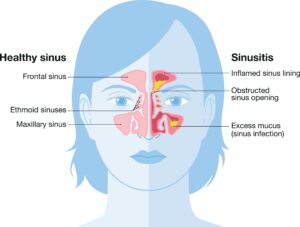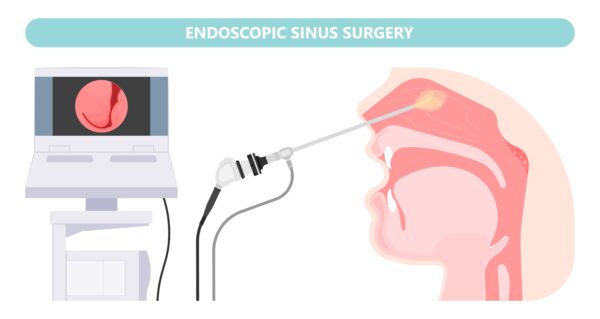Posted by: Maryland ENT in General
Do you suffer from congestion, pressure in your face, or recurring sinus infections? These symptoms may be due to your sinuses.
Sinuses are interconnected cavities in the skull. These cavities are linked to your nasal passages by small channels. The channels let air flow from your nose into the sinuses and allow mucus to drain from every sinus into the nose.
Everyone has four sinus cavities located behind the cheekbones, in the middle of the forehead, between the ears, and behind the nasal cavity. Keep reading to learn more about what sinuses do, issues they can cause, and how to treat sinus problems.
What Role Do the Sinuses Play?

Sinuses typically have mucus and tiny hairs that warm and humidify the air you breathe before reaching your lungs. Breathing in warm, moist air is excellent for your health.
However, breathing in cold air can cause the onset of negative symptoms like coughing, shortness of breath, and wheezing. Another critical role of the sinuses is to protect your skull in case of an injury to the face.
Your sinuses also help keep bacteria and other microorganisms away from your body. They produce thin mucus, draining dirt, dust, and other pollutants out of the sinuses and into the throat. Once swallowed, these pollutants get destroyed by your stomach acid.
Sinus Problems
Your sinuses are usually filled with air and contain a thin mucus layer. However, they may become blocked by viruses, bacteria, or fungi which can cause swelling, infection, and inflammation, among other symptoms.
Not all signs of having a sinus problem linger. Some may go away on their own.
But when your sinuses are infected or inflamed for over a week, there’s a likely chance of developing a condition called sinusitis. They are different types of sinusitis that require treatment, including:
Acute Sinusitis

An acute sinus infection can occur due to a cold, the flu, or allergies. Other factors that can make you more likely to develop acute sinusitis are:
- Having a deviated septum
- Smoking
- Nasal polyps
- Breathing in pollutants
- A weak immune system
Acute sinusitis often begins with cold-like symptoms such as congestion and sinus pain lasting 2 to 4 weeks. You may experience short-term inflammation of the sinuses with swelling of nasal tissues and sinus tissues.
Subacute Sinusitis
If your sinus problems don’t resolve after a month, you may have subacute sinusitis. Even though this type of sinus infection isn’t as stubborn as chronic or recurrent sinusitis, its symptoms will last for about 4 to 12 weeks, increasing your discomfort.
You may experience symptoms like a cough, fatigue, congestion, sore throat, toothache, or pressure in your ears. These are only some of the symptoms that subacute sinusitis can cause.
Seasonal allergies and bacterial infections are two leading causes of subacute sinusitis.
Chronic Sinusitis
Having chronic sinusitis means that it’s lasted for more than three months. It’s more common in people with allergies, structural blockages, growths, and compromised immune systems.
Acute sinusitis can also become chronic if it’s not fully resolved. The inflammation from having chronic sinusitis interferes with the drainage system in your nasal passages leading to a buildup of mucus. As a result, you may experience symptoms such as:
- Headaches
- Snoring
- Nasal congestion
- Swollen areas around your face
- Mouth breathing
- Discolored or thick nasal discharge
- Pounding facial pain
- Reduced sense of taste and smell
Your ENT specialist will often treat chronic sinusitis with corticosteroid sprays and leukotriene antagonists to reduce inflammation. They may also treat any underlying condition like allergies or asthma contributing to your chronic sinusitis.
Recurrent Sinusitis

Do you experience frequent sinus infections several times a year? If so, you may have recurrent sinusitis.
The symptoms of recurrent sinusitis can be unpleasant and frustrating to live with. You might have repeated episodes of headaches, pain, and pressure from blocked sinuses, each lasting ten days or more.
You may also have trouble breathing through your nose and experience a decreased sense of smell and taste. Recurrent sinusitis can be due to different factors such as:
- Allergic rhinitis
- Small nasal openings
- Deviated septum
- Nasal polyps
Treating Sinusitis
The first line of treatment for sinusitis is usually medication. If you have a sinus infection, your ENT specialist at Maryland ENT may choose to treat it with antiviral medications or antibiotics, depending on the cause. If you’re suffering from severe inflammation, they may treat you using oral steroids.
They may prescribe steroid sprays, decongestants, or nose drops for congestion relief. If you have acute sinusitis, nasal washing with saline has shown to be effective.
Aside from medical therapy, other treatment options that your ENT specialist may recommend are the following:
Balloon Sinuplasty
If you suffer from chronic sinusitis, there’s a chance that other treatments may be ineffective. For these patients, an ENT specialist may recommend undergoing a balloon sinuplasty.
A balloon sinuplasty is an outpatient procedure that involves inserting a flexible balloon catheter through the nose and into the opening of your sinuses. After inserting the catheter, the balloon is inflated to unblock sinus passageways and gently widen their walls.
Your ENT specialist removes the balloon catheter and sprays a saline solution to flush out any remaining particles stuck to the walls. The saline solution leaves you clear sinuses while relieving sinus pressure and pain.
Endoscopic Sinus Surgery

Another option is endoscopic sinus surgery if sinusitis persists or other treatments haven’t been successful. Endoscopic sinus surgery provides relief by opening, unblocking, or enlarging your sinus drainage pathways.
Top-Rated Sinus Specialists

Are sinus infections giving you a hard time? The expert team at Maryland ENT has extensive experience diagnosing and treating sinusitis.
Using a highly personalized treatment plan, our ENT specialists will keep your sinusitis at bay and improve your quality of life. Schedule your appointment at Maryland ENT in Baltimore and Lutherville, MD, to find a long-term solution for your sinus problems!



